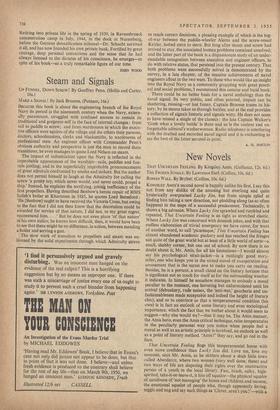Steam and Signals
MAKE A SIGNAL! By Jack Broome. (Putnam, 16s.) BECAUSE this book is about the engineering branch of the Royal Navy its period is the nineteenth century when the Navy, extern- ally paramount, struggled with confused success to remain its traditional and gorgeous self in the face of internal changes : from sail to paddle to screw; and from wardrooms in which the execu- tive officers were squires of the village and the others their parsons, doctors, schoolmasters, clerks and blacksmiths, to wardrooms of professional men. An engineer officer with Commander Penn's obvious authority and perspective is just the man to record these transitions; he even manages to quote Lord Nelson on steam.
The impact of industrialism upon the Navy is reflected in the improbable appearances of the warships—sails, paddles and fun- nels jostling; and in the superficially improbable pronouncements of great admirals confronted by smoke and stokers. But the author does not permit himself to laugh at the Admiralty for calling the screw 'a pretty toy, which never would, and never could, propel a ship.' Instead, he explains the terrifying, jolting inefficiency of the first propellers. Having described Benbow's heroic repair of HMS Safieh's boiler at Khartoum in 1885, he quotes Lord Beresford 'He [Benbow] ought to have received the Victoria Cross, but owing to the fact that I did not then know that the decoration could be awarded for service of that nature, I did not, to my great regret, recommend him. . . .' But he does not even place 'of that nature' in his own italics; he knows how difficult, then, it would have been to see that there might be no difference, in action, between mending a boiler and serving a gun.
The slow work of transition to propellers and steam was en- livened by the solid experiments through which Admiralty strove to reach correct decisions, a pleasing example of which is the tug- of-war between the paddle-wheeler Alecto and the screw-vessel Rattler, lashed stern to stern. But long after steam and screw had arrived to stay, the associated human problems remained unsolved; and the latter part of the book is a dispassionate study of an under- standable antagonism between executive and engineer officers, to do with relative status, that persisted into the present century. That both problems were successfully solved is demonstrated by the survey, in a late chapter, of the massive achievements of naval, engineers afloat in the two wars. To those who would like an insight into the Royal Navy as a community grappling with great practi- cal and social problems, I recommend this concise and lucid book.
There could be no better basis for a naval anthology than the naval signal. Its very public, and often pointed, impact can be shattering, rousing—or just funny. Captain Broome traces its his- tory; by its means takes us through battles; and at the end provides a collection of signals historic and signals witty. He does not seem to have missed a single of the classics : the late Captain Walker's 'Gosh what a lovely battle' is there and so is the ancient and un- forgettable admiral's washerwoman. Radio telephony is interfering with the drafted and recorded naval signal and it is enchanting to see the best of the latter secured in print.
A. II. BARTON


































 Previous page
Previous page